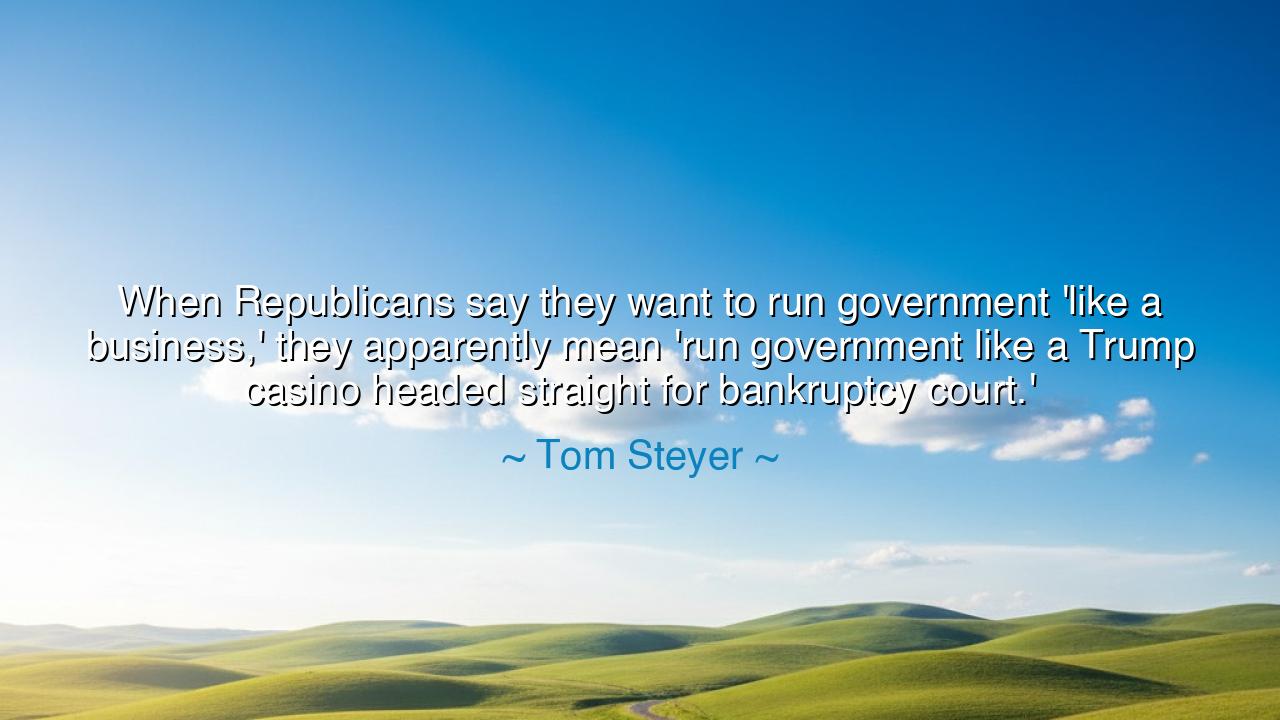
When Republicans say they want to run government 'like a
When Republicans say they want to run government 'like a business,' they apparently mean 'run government like a Trump casino headed straight for bankruptcy court.'






Hearken, children of vigilance and seekers of wisdom, and mark the words of Tom Steyer, who quipped with biting insight: "When Republicans say they want to run government 'like a business,' they apparently mean 'run government like a Trump casino headed straight for bankruptcy court.'" Beneath the surface humor lies a profound warning about leadership, responsibility, and the perils of misapplied principles. Steyer’s words compel us to examine the nature of governance and the dangers of confusing spectacle with substance, style with stewardship.
The origin of this observation is rooted in the modern political and economic landscape, where the phrase “run government like a business” is often invoked as a mantra of efficiency. Steyer, however, strips the veil from this assertion, exposing the fallacy of equating corporate bravado with civic responsibility. Unlike private enterprises, which may fail without immediate ruin to public welfare, government holds the lives, livelihoods, and trust of millions in its balance. To run it carelessly is not merely a misstep; it is a breach of sacred duty.
Consider the metaphor of the casino, a place of glitter, risk, and chance. The Trump casinos, emblematic of lavish ambition and repeated financial mismanagement, serve as a symbol of enterprise without prudence. Steyer’s comparison warns that treating governance as a gamble or spectacle—prioritizing personal gain, image, or short-term theatrics—can imperil the well-being of a nation. The government, unlike a private venture, cannot declare bankruptcy without harming the collective fabric of society.
History offers cautionary echoes of this principle. In ancient Rome, leaders who treated the Republic as a personal stage or a treasury to be plundered—such as Crassus or Nero—saw the structures of law, public trust, and civic order collapse around them. Like a mismanaged business, the machinery of state requires discipline, foresight, and prudence, lest it crumble under the weight of recklessness or hubris. Steyer’s words remind us that governance demands wisdom tempered by responsibility, not the flamboyance of untested enterprise.
The wisdom of the quote is also a call to discernment for citizens. To hear political rhetoric is insufficient; one must probe the substance behind the slogans, evaluating whether policies are sound, sustainable, and aligned with the public good. The allure of running government like a business may appeal to pride or simplicity, yet the measure of leadership lies in stewardship, fairness, and foresight, not in the dramatics of bankruptcy filings or high-risk gambles.
Steyer’s quip also underscores the difference between public and private responsibility. In private enterprise, losses affect shareholders and balance sheets; in government, mismanagement affects schools, hospitals, and the very fabric of civil life. The citizenry, therefore, must remain vigilant, holding leaders accountable for outcomes, not merely promises, lest the theater of governance overshadow its moral and practical obligations.
The enduring lesson is clear: governance requires more than entrepreneurial flair—it demands prudence, integrity, and a devotion to the common good. Spectacle, bravado, or flashy promises cannot substitute for the steady, disciplined stewardship that sustains nations. To conflate business with government without understanding the stakes is to flirt with disaster, and Steyer’s warning rings like a clarion call across time and circumstance.
Practical actions arise naturally: cultivate awareness of political rhetoric versus policy reality; evaluate leaders by outcomes and prudence, not by style or slogans; demand accountability in governance; and recognize that stewardship, like wisdom, is earned through foresight, discipline, and ethical commitment. By internalizing this lesson, one guards both personal and collective well-being, ensuring that government serves the people wisely, rather than succumbing to the hazards of spectacle and misapplied ambition.
If you desire, I can craft an even more epic, narrative version, turning Steyer’s satirical observation into a mythic, heroic tale of governance, responsibility, and the perils of misused power—perfect for immersive audio storytelling. Do you want me to do that?






AAdministratorAdministrator
Welcome, honored guests. Please leave a comment, we will respond soon